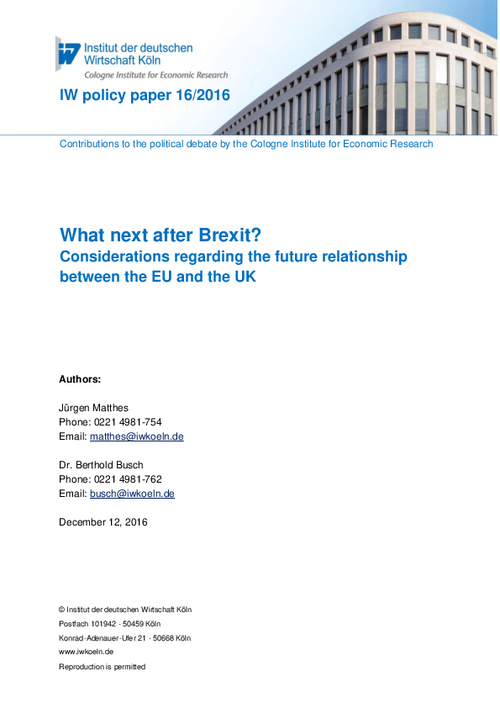In order to be able to assess the future institutional relationship between the UK and the EU, this study organises the relevant facts systematically.

What next after Brexit? Considerations regarding the future relationship between the EU and the UK
IW policy paper

In order to be able to assess the future institutional relationship between the UK and the EU, this study organises the relevant facts systematically.
This is done by using a framework in which two aspects are compared with each other: On the one hand, the extent of the Single Market access for the EU’s current partners (incl. Norway, Switzerland and Canada), and on the other, the concessions agreed by these partners with the EU with regard to free movement of people, relinquishment of regulatory sovereignty (legal harmonisation with the EU) and payments to the EU. Here a clear reciprocity between give and take can be seen, which it is assumed will also be valid for the pending negotiations, particularly as the EU needs to prevent bandwagon effects in terms of other EU countries following the UK example to exit the EU. On this basis we discuss which concessions the UK is likely to give and what kind of access to the Single Market the EU might grant in exchange, if it is to be guided by the existing integration models, and in addition takes into account the British trade deficit with the EU and the substantial political and military role played by the British.
Although the UK would like to retain as broad access to the Single Market as possible, the political restrictions might mean that the UK can only offer medium level concessions overall: small regarding free movement of people, small to medium regarding payments to the EU, and medium to high regarding legal harmonisation with the EU. In this respect, there are clear parallels with the Swiss integration model, since Switzerland also gives the EU medium level concessions on average, and in return receives medium level access to the Single Market. However, in the case of the UK there would be a single overall agreement (rather than many individual agreements as in the case of Switzerland) and concessions would be distributed differently amongst the various categories.

Jürgen Matthes / Berthold Busch: What next after Brexit? Considerations regarding the future relationship between the EU and the UK
IW policy paper

More on the topic
![[Translate to English:] Das Gebäude des Weißen Hauses in Washington, D.C. in den Vereinigten Staaten von Amerika. [Translate to English:] Das Gebäude des Weißen Hauses in Washington, D.C. in den Vereinigten Staaten von Amerika.](/fileadmin/_processed_/c/1/csm_GettyImages-2161499385_White_House_Editorial_884306add8.jpg)
Trump or Harris or ...? What Europe must prepare for
A few months before the presidential election in the USA, Donald Trump has a good chance of being re-elected. On the Democratic side, the incumbent president has withdrawn his candidacy after a long period of hesitation, while Vice President Kamala Harris is ...
IW
Compendium 5.5: CO2 Regulation of Road Transport in Europe
With the Compendium CO2 Regulation in Europe, the IW has been providing the interested public with a comprehensive collection of data on the development of CO2 emissions from passenger car traffic in the European Union, as well as on the applicable regulatory ...
IW